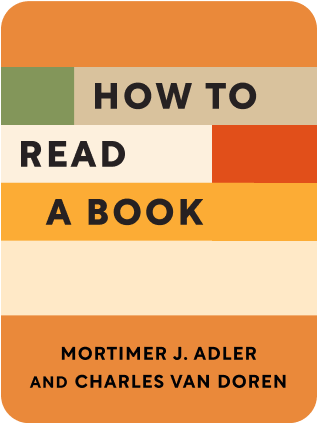

This article is an excerpt from the Shortform book guide to "How to Read a Book" by Mortimer J. Adler and Charles van Doren. Shortform has the world's best summaries and analyses of books you should be reading.
Like this article? Sign up for a free trial here .
Do you want to know the best way to evaluate a book? How should you handle a disagreement with a book’s author? What are the different categories of disagreement?
In their book How to Read a Book, authors Adler and Van Doren discuss the steps you should take to evaluating a book. They say that you must first determine whether the author has answered your questions, evaluate the author’s answers, and then try to understand the author’s point of view before arguing with them.
Continue reading for more on how to evaluate a book and its author, according to Adler and Van Doren.
How to Evaluate a Book
According to the author of How to Read a Book, Adler and Van Doren, when evaluating a book, your job is to determine which of her questions the author has answered and which she has not, and to decide if the author knew she had failed to answer them. (Shortform note: As you begin to evaluate a book, you may also want to think about the subject as a whole and ask yourself: Are there any important ideas the author didn’t mention? Did she leave anything out? If so, how would that missing information change your impression of her argument?)
Complete Your Understanding First
Much like having a conversation with an author, Adler and Van Doren contend that you need to give the author the chance to express herself fully before passing judgment. If you interrupted the author at each sentence to say she’s wrong, you’re not having a conversation that can lead to learning. Therefore, you must finish the other tasks above (outlining the book, defining main terms, understanding the main arguments) before criticizing. Otherwise, your criticism will be meaningless because you won’t be criticizing the author’s actual argument.
(Shortform note: You’ll need to use your own best judgment to decide if you fully understand the author’s arguments. However, if you’re new to the book’s subject, you should be especially cautious about deciding you understand because the less you know about a subject, the more likely you are to overestimate your understanding. This is the essence of the Dunning-Kruger effect.)
The knowledge to understand the author may be present in other works by the author. (Shortform note: Adler and Van Doren cite the example of ancient authors like Aristotle and Plato, but this may also be true of modern authors of multiple books. For example, to fully understand Nassim Nicholas Taleb’s Antifragile, you need to understand the ideas in his earlier work, The Black Swan.)
How to Criticize Well
In Adler and Van Doren’s view, criticizing a book means to comment, “I agree,” “I disagree,” or “I suspend judgment.”
When you’re criticizing an author, Adler and Van Doren caution against being overly contentious or combative. Remember that disagreement is an opportunity to learn something new. Here are some tips for keeping an open mind:
- Do not play devil’s advocate by default. Don’t resent the author for being right or teaching you something new. (Shortform note: You may be especially tempted to resent the author when they challenge one of your political or religious beliefs. Studies have shown that these beliefs are the most resistant to change because they’re intimately tied up with how we see ourselves.)
- Only agree with the author if you’ve fully evaluated their work; don’t just assume the author is right because they’re smart. (Shortform note: This may be even harder (and thus even more important) for authors you respect and admire, as you might naturally evaluate those authors’ arguments less rigorously than authors with whom you disagree.)
- Separate your emotional reaction to the book from the rational one.
- As you read, earnestly try to take the author’s point of view.
| Resolving Difficult Conversations With the Author Separating your emotional reaction to a book from your intellectual reaction and taking the author’s point of view isn’t always easy, especially if the author’s argument threatens an aspect of your life or your identity. In that situation, it may help to think of yourself as entering into a difficult conversation with the author. In Difficult Conversations, authors Douglas Stone, Bruce Patton, and Sheila Heen offer advice for navigating these types of conversations: Remember that our individual experiences shape how we see the world. That means that whatever the author is saying probably isn’t meant as an attack on your principles or your identity; it’s a reflection of their own life experiences. Keeping this in mind can help you not take the author’s ideas personally. Acknowledge and express the feelings that come up as you read—otherwise, they’ll fester and keep you from evaluating the book with a clear head. Try out the “And Stance,” in which you acknowledge that several things can be true at once. For example, you might say, “This author has some good ideas, and some of her views are deeply intolerant” or “I’m a good person, and I’m guilty of the behavior this author is criticizing.” This allows you to see the bigger picture, not just the most difficult part. |
According to Adler and Van Doren, when you agree or disagree, you must justify and provide evidence for your conclusion. Without doing so, you’re merely expressing opinions—you’re not providing a substantive rebuttal to the author’s argument. (Shortform note: When you criticize an author’s argument, make sure you’re responding to the argument itself, not the author as a person. Not doing so is the “ad hominem” fallacy, or attempting to invalidate someone’s argument by attacking their character. This is a fallacy because even people we dislike are fully capable of saying true things.)
Likewise, you should distinguish between the author’s knowledge (arguments backed by evidence) and the author’s opinions (not backed by evidence). Be aware of your own assumptions and remember that your opponent is allowed to assume too, even if her assumptions don’t match yours. If the author asks you to take something for granted, you should do so. (Shortform note: Doing this allows you to evaluate the author’s argument to see if the conclusion follows from the premises; however, it’s possible to craft a logical argument based on faulty assumptions. In this case, you might conclude, “Based on the author’s assumptions, her conclusion is true—however, her assumptions don’t reflect reality.”)
Categories of Disagreement
If you disagree with the author, your criticism must fit into a set of categories:
- Information. You can critique the author on this basis if…
- The author lacks important information (this can happen when an author ignores the relevant work of predecessors).
- The author’s information is wrong, outdated, or unsupported by outside evidence.
- The misinformation should be relevant to the argument—if an author gets an unrelated detail wrong, that shouldn’t derail your opinion of her overall argument.
- Logic. You can critique the author based on logic if her argument contains a logical fallacy. Adler and Van Doren assert that this category is uncommon among great books, which are “great” in part because their logic holds up so well.
- Completeness. You can critique the author’s completeness if you feel she hasn’t fully addressed every important component of her argument or fully analyzed the issue at hand.
According to Adler and Van Doren, if you can’t criticize the author’s information, logic, or completeness, then you must agree with the author’s conclusions.
| Additional Categories of Disagreement While Adler and Van Doren believe these four categories encompass all valid sources of disagreement with an author, there may be others: for example, moral disagreement. It’s possible to disagree on moral grounds with an author who is fully and accurately informed and makes a complete, logical argument. For example, an author who advocates for eugenics may have a sound logically sound argument, but a reader who believes that all human life is equally valuable can still disagree with the author’s conclusions. Additionally, Adler and Van Doren’s categories assume that if part of the author’s argument is false, the author must be uninformed or misinformed. This takes the author in good faith and ignores the possibility that the author has more nefarious reasons for asserting something that is not true (for example, to increase personal profit). While this may not be a concern in the great books, it’s something modern readers may encounter in an increasingly partisan world. Adler and Van Doren’s four categories leave no room to disagree with an author who is willfully misleading the reader. |

———End of Preview———
Like what you just read? Read the rest of the world's best book summary and analysis of Mortimer J. Adler and Charles van Doren's "How to Read a Book" at Shortform .
Here's what you'll find in our full How to Read a Book summary :
- How to be a better critic of what you read
- Why you should read a novel differently from a nonfiction book
- How to understand the crux of a book in just 15 minutes






